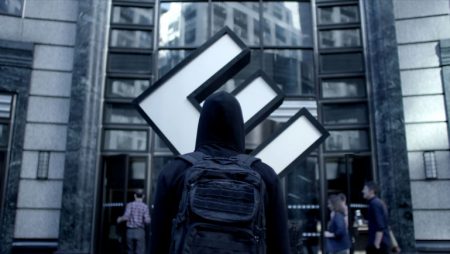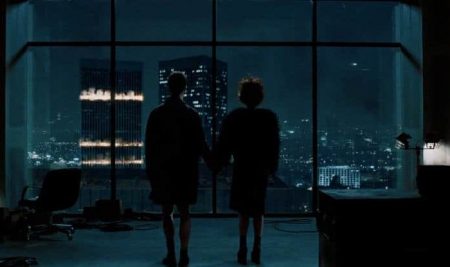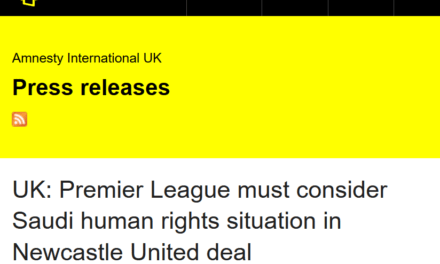It was noted in the previous post, that the underlying plotline structuring Sam Esmail’s Mr. Robot bears a notable resemblance to David Fincher’s Fight Club (1999). Certainly, the comparison has been duly noted and even openly acknowledged by Esmail, with the film serving as inspiration for the series (Sullivan, 2015). In the case of seasons 1 and 2, this inspiration fuels Elliot and fsociety’s attempts to erase the commercial debt that has been accumulated by E Corp. Lines from the characters are riddled with references to the increasing divide between rich and poor, and to the declining significance of democracy in the face of a social and political climate steered by liberal capitalism’s unending and unequal pursuit of wealth. As noted, these ills are embodied in the conglomerate E Corp, or, as Elliot refers to it, ‘Evil Corp’. E Corp can be thought of as a reflection of Apple, with its technology, digital payment services and loan/credit portfolios always encroaching on the lives of the series’ characters. Accordingly, while The Narrator in Fight Club seeks to bring down capitalism, by exploding the headquarters of its leading companies, Elliot seeks to reset the balance by hacking E Corp’s computer database and eradicating the consumer debt it holds.
Consequently, there are some important distinctions to be drawn between Fight Club and Mr. Robot. In the case of Fight Club, our existence is akin to Baudrillard’s (1994) ‘simulacrum’; our lives mere copies of the catalogue’s that advertise the falsity of our individuality. This is brought to bear in the sense of demasculation that is felt amongst the members of Project Mayhem (all male); an anarchist group that emerges and develops from the underground ‘Fight Club’, founded by The Narrator and Tyler Durden. Accordingly, as Volmar (2017) asserts:
… where Fight Club linked consumerism with emasculation and satirized a primordial, proto-fascistic form of manly violence, Mr. Robot may represent a generational shift toward the systemic causes of alienation. More than Project Mayhem, it is the idealism of Occupy and Anonymous that informs fsociety’s hactivist crusade. By reveling in technology’s seedy vulnerability – the corners cut in the interest of profit – they attack consumer capitalism along with the sociopolitical structures that impose it. (2017: 209).
Therefore, though Fight Club seeks to regain a sense of authenticity – through a pursuit of primordial violence, laid bare via a nihilistic crusade that remains levelled against the violent destruction of one’s inauthenticity – it is this self-destruction, which is directed against an economic system, whose obliteration, it is believed, will provide a return to a more authentic, ‘pre-modern’ form of life.
Referring to the novel, such destruction is noted by Bolea (2015), who highlights how ‘The utopic project of assassinating modernity in order to create a premodern age fit for hunters and gatherers is highlighted in the novel in poetic post-apocalyptic fragments’ (2015: 315). While this destruction frames the film’s final scene, the problem here is that, much like apocalyptic/dystopian cinema in general, we never get a depiction of what this new form is, or, more importantly, what it will look like. Indeed, it is this same conundrum which underscores season 2 of Mr. Robot.
What happens next?
In commenting upon the series, Bolea (2015) notes, ‘Like Lars von Trier’s Melancholia, Sam Esmail’s Mr. Robot allows us to take a peek into the end of everything, answering the primary question: what happens after the victory of revolution?’ (2015: 317). Though steering clear of Fight Club’s primordial authenticity, it is apparent that Mr. Robot locates its own capitalist-frustrations amidst a more obvious ‘class struggle’, which itself echoes the slogans propagated by the Occupy Movement’s public derisions of the 1%. To this end, Mr. Robot locates itself in the fallout of the 2008 financial crisis, with Flisfeder highlighting how the series offers some form of ‘cognitive mapping’, evident in the efforts of Elliot’s anti-capitalist mantra and ‘hacker’ skills. Here:
Elliot’s schizo-addict struggles, and the emphasis on the unfixed flows of capital circulating within the semiotic organs of the machine recall the Lacanian metaphor of the ‘breakdown of the signifying chain’, famously used by Fredric Jameson to describe the culture of postmodern late capitalism. (Flisfeder, 2018: 145).
In fact, in contrast to Fight Club, Mr. Robot affords some further insight into this problem. Broadly speaking, while writers, directors and critics are more than capable of highlighting and assessing the problems with capitalism, it is the path we take after its ‘downfall’ which proves troublesome. Echoing this, Flisfeder (2018) argues that while the series can be viewed ‘a conceptual success’, ultimately, ‘it … remains a dramatic failure’ (2018: 143).
For Flisfeder (2018), this is brought to light in season 2, from which the hopes and desires of the first season – the eradication of E Corp’s commercial debt – are brought to bear. In the wake of Elliot’s successful hack of E Corp, he is subsequently arrested and detained for a previous hack on his psychiatrist’s boyfriend. In his absence, his sister Darlene (Carly Chaikin) is left in charge of fsociety as they hide from the FBI and its ensuing investigation, led by the agent, Dominque DiPierro (Grace Gummer). Flisfeder (2018) notes how both fsociety and DiPierro’s investigation ‘derail the radical intentions defined at the outset of the series’ (2018: 147). Consequently:
alongside the anxious dispersals of the fsociety members, works to (re-)territorialise the neoliberal cynicism characteristic of both the immediate post-Cold War period and the current state of Left impotence found in political failure of the so-called Arab Spring, the Occupy movement, the failures of the democratic socialism of Syriza in Greece and Bernie Sanders in the United States, and the recent election of Donald Trump. (Flisfeder, 2018: 147).
To this end, the second series simply reproduces the Thatcherite maxim: ‘there is no alternative’ (Flisfeder, 2018), falling victim to a far more pervasive form of cynicism that, while adequately admonishing the effects of capitalism, ultimately struggles to find a way of recreating or establishing a viable alternative. In effect, the second season of Mr. Robot, fails to provide any alternative vision; a failure compounded by the very real failures laid bare in Flisfeder’s (2018) comments above. Echoing Mark Fisher’s (2009) erudite diagnoses of the 2008 financial crisis, the society inhabited in Mr. Robot remains trapped between the ‘freedom’ that is presented through the eradication of commercial debt, and a limited narrative structure which remains tied to the (anti-)capitalism that such ‘freedom’ beholds. This (lack of) vision is one that misses its mark when aiming to find an alternative to the ideological paradigm underscoring a political-economic system that professes capitalism as unnervingly real (Fisher, 2009). Echoing its tried and tested format, the final twist towards the end of season 2 echoes that which was used at the end of season 1: despite the ‘success’ of Elliot and fsociety in season 1; we are, ultimately, left with the inevitable failure of their actions in season 2.
Double-Coding Capitalism – Bearing a Central Contradiction
It is an important – yet easy – critique to level at Mr. Robot; one brought to light by Volmar (2017):
While Esmail clearly understands millennial angsts and apathies better than any showrunner on television today, we should not confuse articulation with mobilization. Here, Mr. Robot bares its central contradiction once again. The series airs on basic cable, its anti-consumerist appeals brought to you by a few words from the very same sponsors. … On Reddit, fans predictably discuss convolutions of plot rather than the politics of trust-busting or progressive taxation. The critique is an old one – that repackaging dissent as entertainment is the ultimate anodyne against it, regardless of authorial intent. (2017: 210).
Certainly, while Elliot’s desire to join/establish fsociety bears witness to his own frustrations with society at large – literally, it’s in the name – it is also evident that, in the cynicism which Mr. Robot expels, a pervasive ‘tension, irony, and paradox’ in the series as a whole can be found (Volmar, 2017: 209). Indeed, though Elliot displays a certain technical ‘omnipotence’, it is clear that, as Volmar (2017) highlights, such ability is rendered through the ‘personal accounts he hacks in futile yet irresistible attempts to fill his emotional voidness’ (2017: 209). Throughout season 1, we see Elliot ‘hack’ those individuals he wishes to undermine, or even, get close to. It his desire to ‘protect’ his psychiatrist from a boyfriend, who remains married to another woman, which leads to Elliot’s later arrest.
As a result, ‘By peering into the private lives behind the public faces, Elliot cannot help but reinforce his own cynical premonition that individuals reflect the same inauthenticity he sees in brands and advertising’ (Volmar, 2017: 209). As will be discussed further in ‘Part Four’, it is this focus on Elliot’s cynicism which proves integral to the series’ significance. That is, while for Flisfeder (2018), the series offers a ‘double-coded … language that … allows us to better envision the deceptions of the semiocapitalism at the centre of the post-crisis class struggle’ (2018: 147), it is through such ‘double-coding’ that the series’ central conflictions are effectively rendered in the character of ‘Elliot’.
From Joker to Elliot – some early comparisons
At this point, we can begin to draw some initial comparisons between Elliot and the character, ‘Joker’, from Todd Phillips’s (2019) recent adaptation of the comic villain. In commenting upon the Joker, Slavoj Žižek notes that:
Comedy means for me that at that point he [Joker] accepts himself in all his despair as a comical figure and gets rid of the last constraints of the old world. That is what he does for us. He is not a figure to imitate. It is wrong to think that what we see towards the end of the film – Joker celebrated by others – is the beginning of some new emancipatory movement. No, it is an ultimate deadlock of the existing system; a society bent on its self-destruction. The elegance of the film is that it leaves the next step of building a positive alternative to it to us. It is a dark nihilist image meant to awaken us. (Žižek, 2019).
While Žižek commends the film for its ‘nihilistic’ approach to the deadlock of our existing system, there are comparisons to be drawn between the ‘self-destruction’ that the Joker commits and Elliot’s own dissociated identity. For Žižek, it is this sense of approaching some form of ‘zero-level’ subjectivity which, ultimately, serves to clear the decks for a reconsideration of the ‘new’.
In what follows, we can, in the case of Mr. Robot, consider its sense of cynical acknowledgement as a possible ‘double-coding’ that reveals, and, perhaps, opens, the way for a new political direction. By following this path, we will, in later posts, consider how this is brought to bear in the series’ final episodes.
Jack Black is a Senior Lecturer examining the interrelationships between sociology, media and communications and cultural studies. Drawing upon ‘traditional’ media forms (newspaper analysis) as well as television and film studies, Jack has examined a range of topics including nationalism/national identity; multiculturalism; and, collective memory. With particular attention afforded to the relationship between philosophy and critical social theory, this research expands upon the effects of ideology and power on culture and media representations.
References
Baudrillard, Jean. Simulacra and Simulation. (Ann Arbor, MI: The University of Michigan Press). 1994.
Bolea, Stefan, “The Phantasm of Revolution from Fight Club to Mr. Robot.” Caietele Echinox 29. 2015: 314-321.
Fisher, Mark. Capitalist Realism: Is There No Alternative. (Ropley, UK: 0 Books). 2009.
Sullivan, Kevin P., “Mr. Robot: Sam Esmail talks Fight Club inspiration in finale.” Entertainment Weekly. September 3rd 2015. https://ew.com/article/2015/09/03/mr-robot-sam-esmail-fight-club-inspiration-finale/
Volmar, Daniel, “Far from the Lonely Crowd: The Trenchant Techno-Cynicism of Mr. Robot.” Endeavour 41.4. 2017: 208-210. doi: 10.1016/j.endeavour.2017.05.002
Žižek, Slavoj. “‘System deadlock’: Joker artistically diagnoses modern world’s ills – Žižek.” RT. November 3rd 2019. https://rt.com/news/472541-joker-movie-horror-violence-Žižek/









